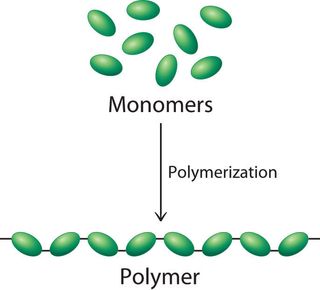Polymers in Building And Construction: Stronger, Lighter in weight, and Extra Resilient
Polymers in Building And Construction: Stronger, Lighter in weight, and Extra Resilient
Blog Article
Discovering the Varied Applications and Advantages of Polymers in Different Industries
Polymers, with their diverse series of residential properties and functionalities, have come to be crucial in various sectors, each gaining distinct take advantage of their application. Polymers. From enhancing safety and security and performance in the vehicle field to revolutionizing medical devices in the healthcare sector, polymers play an essential role. Their environment-friendly nature is modifying the landscape of sustainability practices. As we look into the depths of polymers in electronics, we discover advanced innovations, while their structural honesty transforms the world of construction and infrastructure. The pervasive impact of polymers throughout sectors is a testimony to their flexibility and flexibility, shaping the future of many markets.
Automotive Industry Applications
Polymers play a crucial function in enhancing the performance and longevity of numerous parts within the automotive industry. These versatile materials are thoroughly used in the manufacturing of different components, varying from indoor elements to under-the-hood applications. One noticeable use of polymers in the automobile market is in the manufacturing of light-weight components. By replacing conventional steel get rid of polymer-based choices, lorries can attain enhanced fuel effectiveness without jeopardizing on strength or security.

Healthcare Market Advantages
In different medical care applications, the benefits of using polymers are commonly identified for their varied array of advantageous buildings. Polymers play a vital function in the medical care industry as a result of their adaptability, biocompatibility, and cost-effectiveness. One of the main advantages of polymers in medical care is their capacity to be tailored to specific requirements, such as adaptability, durability, and biodegradability, making them ideal for a variety of clinical applications.
Polymer-based materials are thoroughly made use of in medical gadgets, such as catheters, implants, prosthetics, and drug shipment systems, because of their biocompatibility and capacity to mimic natural tissues. These materials can decrease the threat of sensitive responses or denials, boosting client safety and outcomes. Furthermore, polymers are lightweight, making them appropriate for wearable clinical devices and ensuring person comfort.
Furthermore, polymers make it possible for the advancement of cutting-edge therapy techniques, such as hydrogels for cells design and nanocomposites for targeted drug shipment. Their simplicity of processing and sanitation makes them essential for maintaining high criteria of hygiene in medical care setups. Overall, the varied advantages try here of polymers add significantly to developments in medical innovation and person care.
Ecological Benefits of Polymers

In addition, polymers can add to energy savings because of their light-weight nature. In sectors such as transportation, lightweight polymer products can help lower fuel consumption and greenhouse gas emissions. Furthermore, polymers can allow the advancement of energy-efficient items such as insulation products that boost energy preservation in buildings.
Additionally, polymers play an essential role in lowering water contamination. For instance, using polymer-based filtration systems can successfully eliminate toxins and pollutants from wastewater, safeguarding water resources and communities. Generally, the environmental benefits of polymers make them valuable properties in advertising sustainability and green methods throughout different markets.
Polymers in Electronics and Innovation
Taking into consideration the raising need for cutting-edge and sustainable services in modern-day sectors, the integration of advanced polymer technologies in the realm of electronic devices and innovation has actually become a crucial strategy for driving efficiency and performance. Polymers have actually reinvented the electronics industry by making it possible for the manufacturing of lighter, extra versatile, and long lasting electronic tools. From smartphones to clinical tools, polymers play a vital function in boosting item layout and performance.
One substantial advantage of polymers in electronic devices is their shielding residential or commercial properties, which assist secure browse around this site fragile electronic components from ecological factors and electric disturbance. In addition, polymers are important in the advancement of versatile displays, wearable innovation, and printed electronic devices, using countless opportunities for creating clever and interconnected tools.
In addition, using polymers in electronic product packaging has resulted in advancements in miniaturization and thermal monitoring, boosting the general efficiency and reliability of electronic systems. As innovation proceeds to advance, the flexibility and adaptability of polymers will certainly drive further technology in the electronics sector, shaping the future of innovation.
Duty of Polymers in Construction and Framework
The combination of innovative polymer products in construction and facilities projects has transformed the way structures are made and constructed in modern times. Polymers use various benefits in the building and construction market as a result of their versatility, toughness, and cost-effectiveness. One key function of polymers in building is their usage in coverings and sealants, offering protection against ecological factors such as wetness, UV radiation, and rust. Additionally, polymers are utilized in the manufacturing of lightweight and high-strength composite materials, improving the architectural integrity of buildings while decreasing total weight.
Additionally, polymers play an essential role in lasting building techniques by making it possible for the advancement of energy-efficient frameworks. Shielding materials made from polymers help regulate indoor temperature levels, reducing the requirement for heating and cooling down systems and eventually reducing power consumption. Additionally, making use of polymer-based composites in infrastructure jobs such as bridges and roadways enhances their durability and lowers maintenance costs. In general, the incorporation of polymers in building and facilities showcases their significant impact on contemporary engineering practices.
Conclusion
In verdict, polymers play an essential role in different markets look what i found such as vehicle, health care, ecological, electronic devices, and construction. From enhancing fuel performance in automobiles to improving clinical tools, polymers supply various advantages.
Report this page